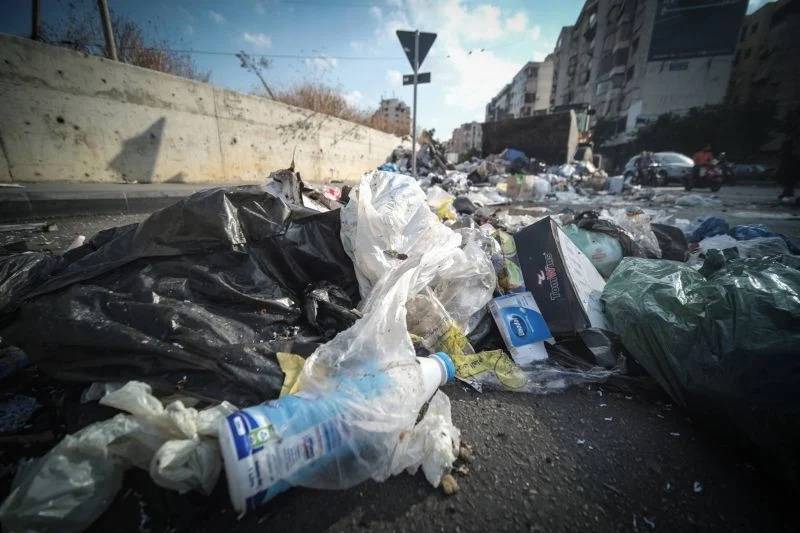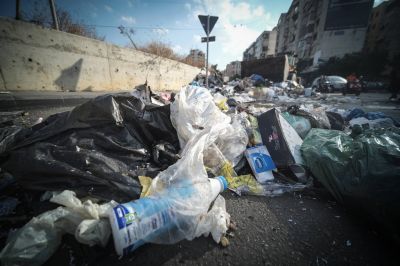
Waste on a road in Lebanon. (Credit: João Sousa/L'Orient Today)
Since the start of the 2019 economic crisis, consumption has dropped in Lebanon and this has reduced household waste.
On the other hand, recent years have seen a growing trend towards recycling, not out of environmental concern, according to associations working in this sector, but with the aim of making profits by reselling certain materials.
While the most vulnerable individuals collect plastic, cardboard or metal from trash bins to survive, others simply take advantage of the buy-back system for recyclable waste to make ends meet.
This does not mean the crisis has spared NGOs and private companies working in recycling, particularly since oil-price hikes have increased transportation costs from collection points to sorting centers and recycling plants.
NGOs and companies also struggle to meet operating costs, thus affecting their viability. In order to continue to operate and expand across the country, private companies and environmental NGOs alike are seeking new investment, which remains hard to come by.
For those wanting to avail themselves of such services or seeking “green” investment opportunities, local civil society actors with recyclable waste-collection programs are sketched below.
TERRE Liban
Founded by ecologist Paul Abi Rached in 1994-95, this Baabda-based association was quick to start raising awareness of the importance of sorting at source and recycling and campaigning for the collection of paper, particularly in schools.
Since its birth, Terre Liban has worked with both the public and private sectors. Today, it offers training courses to 200 municipalities on source separation, using tutorials to create a waste-collection area. The NGO is also behind a color-coded sorting system, which was introduced in 2005 and adopted by the Environment Ministry and a number of municipalities.
TERRE Liban currently focuses on promoting the composting of organic waste, which provides farmers with high-quality soil enrichment and could serve as an important source of income as it has a selling price of up to $2,000 per ton.
Abi Rached said that the processing of organic materials is as important as the processing of recycling. Composting is not that common in Lebanon, he added, although organic waste is a major contributor to climate change, emitting 25 times more CO2 than other types of waste.
For more information, contact TERRE Liban at +961 5 92 30 60 or via e-mail info@terreliban.org
Cedar Environmental
This environmental and industrial engineering company, which Ziad Abichaker founded in 1995, has a plant equipped to recycle various types of household waste. It specializes in composting and recycling plastics, including those that are not generally considered recyclable, including coffee capsules — which are turned into solid material with a variety of uses in construction, cladding, etc. — as well as glass, which is quite rare in Lebanon. Its activities also include paper and cardboard recycling.
Based in Beirut, the company’s main customers are municipalities, in addition to a number of industries that seek to be more socially responsible and comply with environmental standards. Municipalities pay for the recycling and composting services through their existing tax base. Cedar Environmental’s main municipal project was to create a waste treatment center in Beit Mery, launched amid the 2015-16 waste crisis.
The company also services households, setting up collection points where individuals can drop their recycling, free of charge, at various locations around Beirut, Metn and Kesrouan.
For more information, please contact the NGO via info@cedarenv.com
Arcenciel
Pierre Issa founded this Beirut-based social business in 1985. It handles the recycling of plastic, aluminum and paper, which it collects free of charge from its various centers, notably in Jisr al-Wati. This waste is then sorted and compressed at its two centers in Baabda, Mount Lebanon, and Taanayel, Bekaa Valley. It is then resold to industries, which helps to finance Arcenciel’s social activities. It is also known for collecting and decontaminating medical waste.
Arcenciel’s Taanayel center started collecting organic waste from the area’s farm animals in the summer of 2023, with the aim of composting and fermenting the biodegradable material to produce biogas.
“The collection and treatment of this waste will help to improve the quality of the water in the Litani River,” said Arcenciel’s head of fundraising Nadim Abdo.
For more information, please contact Arcenciel at +961 1 495 561 ext. 5, or via email: arcenciel@arcenciel.org
Ecoserv
Gaby Kassab and Sassine Mazraani founded this NGO in 2018, specializing in the treatment of hazardous waste, particularly electronic waste of all kinds. The team meticulously dismantles plastics, metals, electric cables, solar panels and the like in order to recycle them safely, preventing hazardous pollutants from entering the natural environment.
Kassab, who has devoted a large part of his career to managing companies working in smart technologies, stressed the importance of having specialists working in this field, given the difficulty of dealing with hazardous waste and the significant potential dangers of its pollutants.
Based in Zouk, Ecoserv welcomes all electronic waste at its 120 collection points across the country free of charge and can be contacted to recover large equipment at the end of its life. To raise awareness of the importance of treating hazardous waste before it ends up in a landfill, let alone the sea, the association sends its representatives to communicate with potential users at its various collection points.
For more information, please contact Ecoserv at +961 9 220 094 or via e-mail info@ecoservlb.org
Lebanon Waste Management
Pierre Baaklini founded this private company in 2019, which unlike older recycling organizations is profit driven. Born out of the economic crisis that erupted that year, this company solely focuses on the collection, sorting and compression of solid waste, mainly plastic, cardboard, metal, aluminum, polyester and paper. Thanks to the company’s “Drive Throw” service, consumers can drop off their bags of recycling and collect cash from drop-off points, and/or donate it to charity.
The waste is then transported to its centers in Sad al-Boushrieh and Mirna Chalouhi where around 30 employees are charged with sorting, selling to local factories or export. Baaklini announced the creation of new drop-off points thanks to business partnerships, including with gas stations.
For more information, contact LWM at +961 81 312 186 or e-mail admin@lebanonwastemanagement.com
Live Love Recycle
Founded in 2018 by Georges Bitar, this NGO has a mobile app enabling people to request waste collections at home or at its 10 points in Beirut, Tripoli and on the coast in Metn and Kesrouan. In June, a dozen new drop-off points were inaugurated in collaboration with gas stations. In return for the materials collected — including cardboard, nylon, plastic, used cooking oil, household appliances, clothes, medicines and metal — the association awards points that offer the incentive of gifts or cash.
The waste is sent to the two sorting centers with whom Live Love Recycle works, in Mansourieh and North Lebanon. The NGO collects glass even though, according to its president, the capacity to recycle it in Lebanon has been limited since the Israeli air force destroyed Maliban, a large glass factory, formerly the largest in the MENA region, during the 2006 war.
The materials collected are sold to around 40 factories in Lebanon or exported. “This is our only source of income,” said Bitar, allowing “us to finance the association’s activities.”
For more information, contact LLR at +961 3 113 141
L'Écoute
Founded in 1999 by Bishop Jean-Marie Chami, L'Écoute is a social rather than purely environmental association. It has its own circuit for the collection and sorting of recycling — including paper, cardboard, nylon, plastic, metals and glass (which is reduced to a sand-like consistency for construction purposes), as well as electronic equipment (which is dismantled or repaired to be given away or sold).
Bishop Chami turned his office in the Beirut parish of Mar Elias into a recycling collection point 23 years ago. He sold the recyclables to finance charitable work for hearing-impaired young people and the social rehabilitation of petty criminals. Since the crisis, L'Écoute has also been helping many struggling families.
Today, the association has a large center in the Ain Saade industrial zone where compacting and shredding are handled and people can call to make contributions. Around half of the center’s 20 or so employees are hearing-impaired. Consumers can drop off bags of recycling free of charge and L’Écoute’s truck drivers take a modest contribution for collecting waste. It also delivers recyclables to processing plants.
For more information, contact the association at +961 76 176 234 or e-mail at info@lecoute-lb.org
Yalla Return
Co-founded in 2020 by Rabih al-Chaar, this start-up has set up the smartphone Nadeera app, which explains which recycling the company collects and where to drop it. Yalla Return has 16 collection points in Lebanon, which will soon become 30, Chaar explained, adding that it is also present in Dubai, Abu Dhabi and Riyadh.
“We currently have 20,000 users in Lebanon,” he said. “Our business model is to pay users per kilo of recyclable material [prices may vary depending on the product and the market price]. As soon as the bill hits or exceeds LL100,000, the user can collect it, or donate it to one of the charities that work with us.”
The start-up accepts plastic, aluminum, cans, paper and cardboard. More recently, it has also taken on electronic products, glass and textiles.
Nadeera is also equipped with an artificial intelligence system that enables users to check whether the product they are about to place in the recycling bin is actually recyclable and whether the company accepts it.
For more information, contact the association at +961 81 091 359 or via e-mail info@nadeera.org
This article was originally published in French in L'Orient-Le Jour. Translation by Joelle El Khoury.

